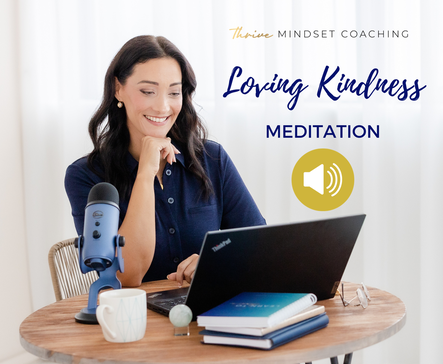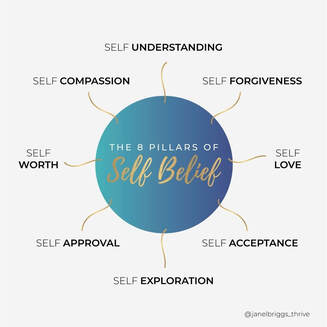AuthorJanel Briggs Categories
All
|
Back to Blog
Worrying is Pointless6/11/2023 A simple idea to help you stop worrying.I meet many women who are stuck in what we call in coaching “worry loops”. Where the mind becomes fixated on all the negative what IF’s within a situation. And one worry thought leads to another and another! Once you’re in a worry loop it can be hard to take yourself off the worry train. But here are 4 reasons why I believe worrying is pointless: 1. Worrying doesn’t change the outcome If you think about it, have you ever altered the course of an event by spending all that energy worrying? Probably not. So why do we waste so much precious energy on it? 2. It robs you of the present moment Life’s most beautiful moments are happening right now. When you worry you miss out on “being present” and all the fun, connection and beauty that’s around you. 3. Worrying zaps your confidence and inner peace It’s like carrying a massive problem sack with you everywhere you go. It holds you back and keeps you from showing up as your best self. 4. Worrying is a MASSIVE trigger for ANXIETY! What IF’s and worst-case scenarios type thoughts are a red flag for the mind to trigger anxiety alarm in the body and send out the troops to fight the “perceived danger”. Insert >> sleepless nights, mental and physical exhaustion, MORE racing thoughts and all those annoying anxiety symptoms. It's super important for me to share that you can stop the worry train.It's possible, perhaps this week if worry is at the forefront of your mind you can start here:
Step 1 - Become aware of when your mind is drifting to worry. Step 2 - Take a breath and remind yourself that this train of thought is essentially pointless, you cannot control all the “what IF’s” and this thinking will lead to anxiety. Step 3 - Let it go, not every detail has to be decided today. Practice bringing your mind back to the present moment. It's crucial to remember that worrying drains your precious energy and robs you of the beauty of the present moment! What's more important? By recognizing the pointlessness of worrying, you can be more proactive about your anxiety. Janel Briggs Thrive Mindset Coaching ps. Look out for a special announcement from me tomorrow 07-11-23! Jump on my EMAIL LIST and be the first to know! Something new is coming 😊 (hint: to help you off the worry train!).
0 Comments
read more
Back to Blog
Phew... well, this past week has been A LOT to process, hasn't it? I've felt it too, the sense of confusion, helplessness, and overwhelming emotions from witnessing a world and people in crisis. Sick to my stomach reading and listening to the news, hearing the division and clash of words, opinions, and beliefs all over social media on topics that are far away and closer to home. As we’ve seen for hundreds and thousands of years, division brings destruction. Sadly, I have no solution or answers for you. But I do know that we’ll never be able to right the wrongs of the past with the same thinking that got us here. Often in times like these, when the world-fear and anxiety storm rages I get a little quieter. I go inward to reflect, process my emotions, pray for humanity and peace, and I count my blessings. I also put in place a few essential practices that assist my mindset:
If you're struggling with feelings of hopelessness and sadness from the weight of division in our world I recorded a special meditation for your this week. It's based on an ancient practice that cultivates goodwill and universal friendliness towards oneself and others. After I have done all I can to tackle my emotions and educate myself on a tough problem, this recording helps me to re-focus my mind and nurture my spirit. Then I'll perhaps take a walk, listen to music, meet a friend for a chat, eat something nutritious, read a good book, go for a bike ride or take a nap. These are all constructive ways to support my mindset to fill time that might otherwise have been wasted on worry about all the uncontrollable's in our world today. Take care, JB
Back to Blog
*TRIGGER WARNING* In honour of World Suicide Prevention Day (Sep 10th 2023) This email talks about grief in losing a loved one to suicide, and how you can support someone you love through a mental health crisis. Three years ago, I tragically lost my dearest friend to suicide. A beautiful fun-loving soul, the kind of woman who had a smile and laughter that lit up the room. We connected on a deep level, even though she was 12 years younger. I think it’s because we shared similar personal, life and spiritual values. We had an interest in so many of the same things, from learning and travel, to cooking and our love for animals. We loved nothing more than to go for lunch in a cosy cafe and sit chatting for hours over cups of tea. Her tragic death taught me many lessons about life, the world, the medical system and myself. I've come to realise the hardest part of grief, in losing someone you love to suicide - is the guilt. Could I, should I … have done more? The answer in the mind is always yes. If I had my time again of course I would do so many things differently. But, in my heart I know I did the best I could at the time. Part of the healing process has been to look at my actions and reactions in this event with my mentor and she taught me something extremely important: Hindsight is a beautiful thing, but no amount of overthinking it will bring peace or bringher back. Acceptance is the key to healing. I’ve come to realise that my fear of “losing her” in her mental and physical health battle kept my mind clouded and captive. My voice of fear said: “What if I say the wrong thing and she dies? I don’t know the answers for how to help her in THIS pain”. Instead of tuning into my voice of wisdom: “You can never say the wrong thing when it comes from a place of love. What if you say the right thing and she lives?”. This is why I am so passionate about helping women with anxiety to learn how to quiet their voice of fear and tap into the loving kindness of their intuition, their voice of wisdom. By encouraging, understanding, reaching in, and sharing experiences with others, Suicide Prevention Day is about giving people confidence to take action to prevent suicideGrief, as you probably know if you've experienced the it, has this way of stripping your heart bare to the darkest depths of your soul. And somehow over time your heart begins to slowly mend the cracks. I guess is the power of healing and love. But, you are for sure never the same person again. The anniversary of her passing each year coinciding with World Suicide Prevention week every September I know as a message for me to remember to, and not be afraid to, tell her story. I will continue to bring light where I can to the darkness. She is worth it, and so are you. This is a message for anyone who has a loved one or friend who struggles with their mental health.HOW YOU CAN HELP SOMEONE YOU LOVE IN A |
|
Stay Connected
Subscribe and be the first to access new blog content news & updates. |

 RSS Feed
RSS Feed





























